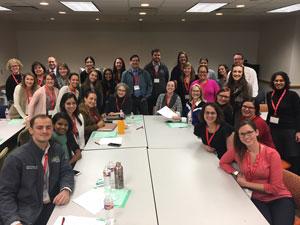
Center for Child Health Policy and Advocacy
In collaboration with the American Academy of Pediatrics (AAP) and Texas Pediatric Society (TPS), the Center for Child Health Policy and Advocacy convened a conference on advocacy. This one-day conference brought together an interdisciplinary group of faculty, fellows, residents, and medical students at Texas Children's Hospital. The goal of this conference was to provide attendees with a theoretical framework and practical strategies on how to make advocacy work scholarly. The conference was kicked off with a Grand Rounds presentation with speakers Mark Del Monte, CEO of the AAP, and Kim Edwards, Chapter Chair of the Texas Pediatric Society. In the afternoon, attendees participated in workshops on the advocacy portfolio, social media advocacy, frontline community advocacy, and sub-specialty advocacy. The conference concluded with a debriefing session on next steps to enhance the future advocacy experiences of attendees. Suggestions included more collaboration across disciplines in advocacy efforts and creating a database of individuals currently engaged in advocacy.
November 15-16, 2018
The Center for Child Health Policy and Advocacy, under the leadership of Dr. Claire Bocchini, hosted the Rome Visiting Professorship sponsored by the American Academy of Pediatrics (AAP). This two-day workshop brought together faculty and residents from all academic pediatric hospitals in Texas. The goal of the workshop was to discuss how to develop and grow a statewide advocacy collaborative among academic pediatric hospitals.

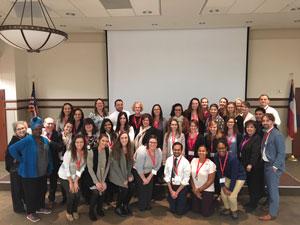
The conference was facilitated by Dr. Ben Hoffman, a faculty leader for the AAP’s Community Pediatric Training Initiative, and the Texas Pediatric Society (TPS). The conference organizers included Drs. Bocchini, Sandy McKay, Nancy Kelly, and Ryan Van Ramshorst. During the conference, Dr. Hoffman led the group through several discussion including defining advocacy, setting priority areas, and developing a collaborative. Clayton Travis, Advocacy and Health Policy Coordinator for TPS, highlighted child health priorities in Texas and how to engage legislators through advocacy. By the end of the conference, the group developed concrete steps for moving the advocacy collaborative forward with continued support by TPS.
October 19 th , 2018
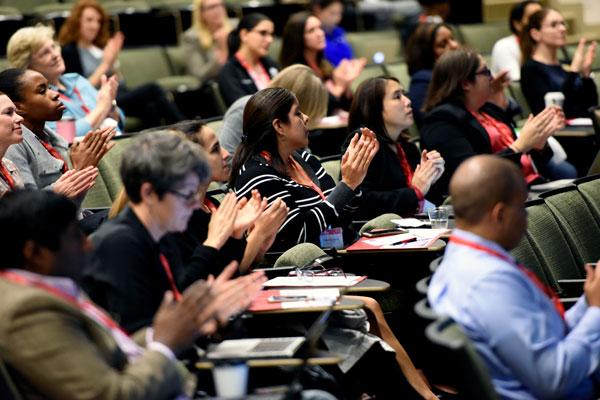
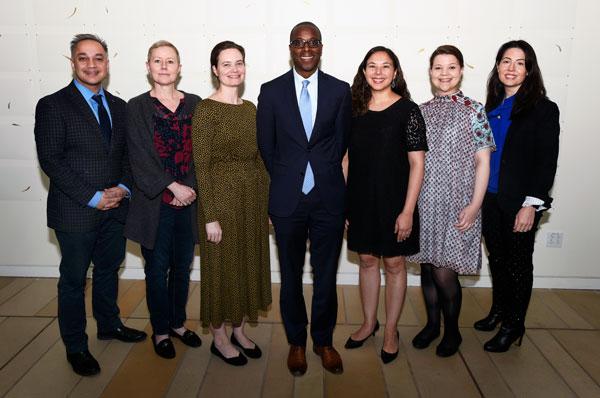
On Friday, October 19th, the Center for Child Health Policy and Advocacy convened its second annual multidisciplinary policy conference in Houston, Texas. The event, “Policy to Practice: The Social Determinants of Child Health: One Year Post Hurricane Harvey”, co-hosted by Rice University’s Kinder Institute for Urban Research, brought together individuals from diverse backgrounds to explore the current and future state of addressing social determinants of child health during natural disasters.
National public health and research experts engaged the audience in dialogue surrounding methods, strategies, public health impact, and legal and ethical considerations in addressing child health during natural disasters. Center director, Dr. Jean Raphael highlighted the importance of collaboration across disciplines. "Hurricane Harvey impacted children in so many ways. It was important to have all key stakeholders involved in this conference. Our Center promotes a multi-sector approach to improving child health. So it was great to assemble such a great representation of Houston at this conference,” Raphael said.
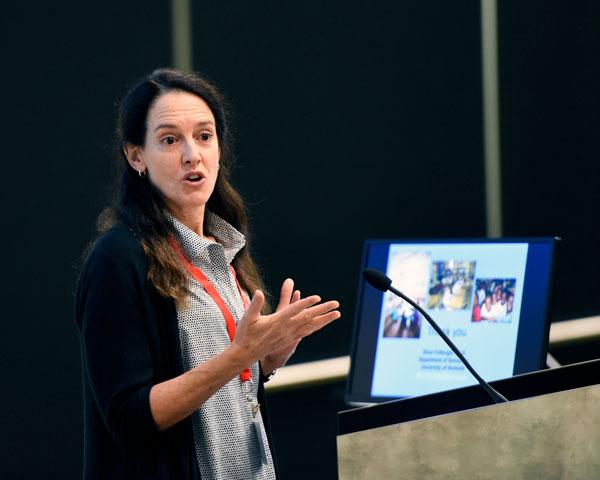
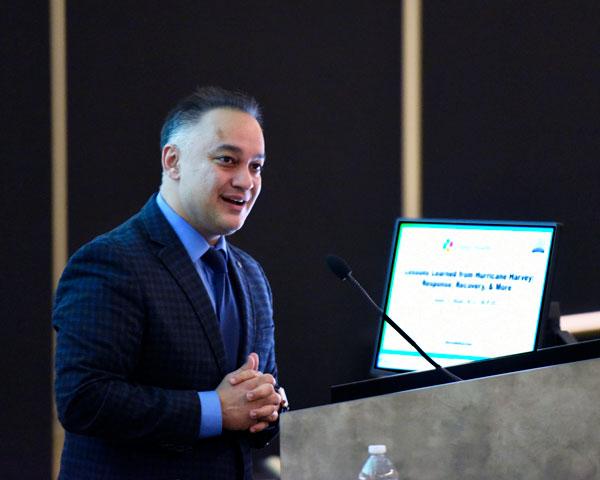
Conference co-chairs, Drs. Michelle Lopez and Rachel Kimbro, kicked-off the conference. Dr. Alice Fothergill, author of “Children of Katrina” gave the opening plenary talk detailing her work with children impacted by natural disasters. Dr. Umair Shah, Executive Director of Harris County Public Health, gave the second plenary presentation, describing the public health response to Hurricane Harvey.
Following lunch, conference attendees took part in a series of panel discussions on housing, education, and public health responses to natural disasters. Dr. Raphael said, "With this conference, our goal was to reflect on the experiences of children during Hurricane Harvey and determine best practices for future natural disasters. We brought together experts from all over the city. We anticipate that our Center can continue to foster inter-disciplinary discussions to promote child health and well-being."
February 9, 2018
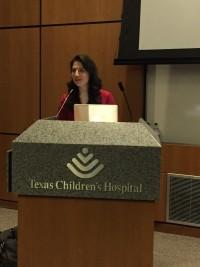
During this session of Pediatric Grand Rounds at Texas Children’s Hospital, Center faculty member Dr. Keila Lopez gave a presentation entitled, “Using the Force: Leveraging Technology to Reduce Health Inequities in Pediatric Chronic Disease.” Dr. Lopez’s presentation summarized existing inequities in pediatric chronic disease and provided an evidence-based rationale for the use of technology to address disparities in adolescent chronic disease. Dr. Lopez also presented some of her work in designing technology-based interventions for adolescents with congenital heart disease.
January 9, 2018
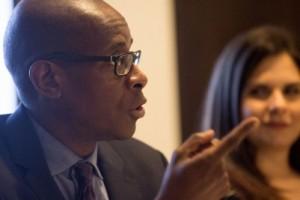
Dr. Raphael participated as a panelist for the 2018 TMC Health Policy Course , a first-of-its-kind collaboration between the Texas Medical Center's academic institutions. This session, called TRUE or FALSE, focused on challenging common myths about the United States health care system. Topics discussed included the differences between health versus health care, costs of medical care, overtreatment, causes of health care waste, and value-based purchasing. Moderator Tim Garson, Director of the Texas Medical Center Health Policy Institute polled audience members about a number of potential health care myths and engaged panelists about their perspectives.
(Houston, TX) With an ability to design research to meet urgent community needs—and to directly apply that research to create change—researchers and community leaders are powerful partners for impacting community health needs.
As members of one of only 15 three-person teams selected, Drs. Quianta Moore and Rachel Kimbro, faculty members for the Center for Child Health and Advocacy, join Interdisciplinary Research Leaders, a leadership development program led by the University of Minnesota with support from the Robert Wood Johnson Foundation. Drs. Moore and Kimbro, along with Felicia Jackson, manager of family support services at the Houston Area Urban League, will join a diverse group of researchers and community leaders—directors of nonprofits, psychologists, community organizers, and sociologists—located across the country, to collaborate and innovate to solve persistent health challenges. Together, these fellows will help advance a Culture of Health—one that places well-being at the center of every aspect of life.
Each year, the program chooses two project themes.Drs. Moore and Kimbro’s team chose to design their project to address community and individual resilience and health in Houston’s African-American community. The data collected from this project will help their community partner and other stakeholders to develop policies and strategies to improve community and resident health.
Along the way they will develop high-level leadership skills through mentoring, networking, and an advanced leadership curriculum. While participating in the program, they will continue working full-time, applying new knowledge and leadership in their community and field.
“This year’s fellows are addressing significant challenges communities face in achieving better health and health equity. We are excited to see the unique, diverse teams entering this program, and believe this cohort will demonstrate the power of community-engaged interdisciplinary research to solve real-world problems,” says Michael Oakes, PhD, director of Interdisciplinary Research Leaders and professor at the University of Minnesota. “Through this program, fellows will learn the leadership skills necessary to help build a Culture of Health.”
Additional partners providing training and support to fellows include: AcademyHealth, ISAIAH, and Twin Cities Local Initiatives Support Corporation.
Interdisciplinary Research Leaders is one of a number of leadership development programs supported by the Robert Wood Johnson Foundation (RWJF). These programs continue RWJF’s legacy of supporting the development and diversity of leaders. Initially focused on health and health care, the programs have been expanded, because the Foundation knows that building a Culture of Health requires all of us in every sector, profession, and discipline to work together. The next application period for many of these programs will open in early 2018. Additional information is available at https://interdisciplinaryresearch-leaders.org/.
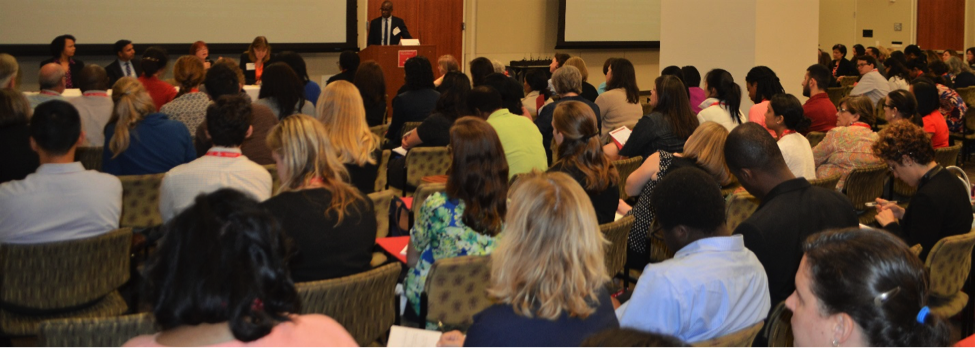
On Friday, November 3, The Center for Child Health Policy and Advocacy at Texas Children’s Hospital convened its first multidisciplinary policy conference in Houston, Texas. The sold-out event, “Policy to Practice: The Future of Social Determinants of Health Screening and Interventions”, co-hosted by the Baker Institute for Public Policy, brought together over 130 individuals, from diverse backgrounds, to explore the current and future state of addressing social determinants of health.
National public health and research experts engaged the audience in dialogue surrounding methods, strategies, public health impact, and legal and ethical considerations of implementing screenings and programs in the community and clinical practice. Center director, Dr. Jean Raphael was pleased with the audience diversity. "Our Center focuses on a multi-sector approach to improving child health. So it was important that this conference reflect that model,” Raphael said.
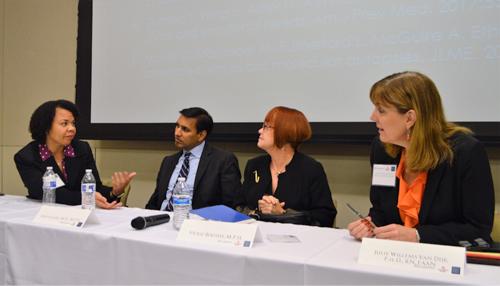
Moderated Panl (l to r): Dr. Moore, Dr. Garg, Ms. Boothe, Dr. Willems Van Dijk
Conference co-chair, Dr. Michelle Lopez, a hospitalist at Texas Children’s Hospital and faculty member of the Center for Child Health Policy and Advocacy, kicked-off the conference. Following the plenary sessions, conference co-chair, Dr. Quianta Moore, child health policy fellow at Baker Institute and faculty of the Center for Child Health Policy and Advocacy, along with fellow presenters Drs. Arvin Garg, Julie Willems Van Dijk, and Ms. Vickie Boothe participated in a moderated panel discussion led by Dr. Raphael.
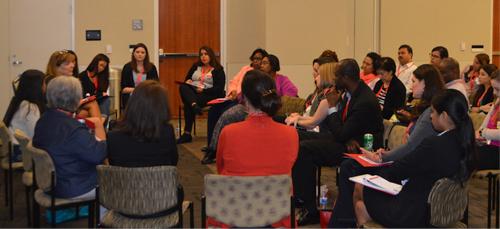
Dr. Willems Van Dijk workgroup
Following lunch, conference attendees had the opportunity to participate in one of three workgroups to further explore and set priorities for addressing social determinants of health. Ms. Boothe led participants in social determinants of health program evaluation, Dr. Willems Van Dijk on social determinants of health and population health, and Dr. Garg on applying research to practice. When asked about future conferences, Dr. Raphael said, "With this inaugural conference, our goal was to bring together experts from diverse sectors to have a meaningful conversation about social determinants of health as they impact the health of children. We brought experts together who do not typically interact. We hope that our Center can continue to act as a convener and foster some new collaborations that will improve child health in our community."
Social determinants of health (SDOH) are the conditions in which people are born into, grow, work and live, that influence people’s overall health and wellbeing. There is a growing acknowledgement that addressing SDOH is an important component of reducing healthcare costs and improving population health. This event brings together national public health and research experts to engage in a dialogue on the current and future state of addressing social determinants of health, and experts will address the following questions:
Featured Speakers:
Moderator:
This event is co-hosted by Center for Child Health Policy and Advocacy at Texas Children's Hospital Baylor College of Medicine, and Rice University's Baker Institute for Public Policy, Center for Health and Biosciences.

Center members, Drs. Quianta Moore and Keila Lopez, presented during the 15th Annual Disparities in Health in America: Working towards Social Justice Summer Workshop. The workshop provided a comprehensive understanding of health disparities, investigated approaches to enhancing health equity, and provided participants with a broad base of knowledge related to a bio-psychosocial approach in addressing health disparities in minority and medically underserved populations.
Dr. Moore’s session entitled “Improving Generational Equity through Investments in Early Childhood Development” focused on brain development in early childhood, factors that hinder optimal brain development, and policies and investment strategies to improve health and economic disparities. Dr. Lopez’s presentation “Neurocognitive and Health Disparities in Congenital Heart Disease” highlighted the life-long surveillance and disease management requirements of the congenital heart disease ‘survivor’ population, and their vulnerability to neurocognitive, mental, and other health disparities-- including executive functioning deficits, depression, anxiety, and lapses in care.

Several Center members attended the Hope in Action Doctors for Change 5th Annual Luncheon. Doctors for Change supports is a non-profit organization which supports advocacy efforts towards access to care, mental health, anti-human trafficking, and access to a healthy lifestyle. At this year’s luncheon, Honorary Chair Ginni Mithoff will join us in presenting local Houston health policy leader Vivian Ho, PhD, with this year’s DFC Healthcare Advocacy Award, for her work advocating for a healthier Houston and recent report on the state of health coverage in Texas. Center faculty member Dr. Claire Bocchini (left) is one of the founding members of Doctors for Change and currently serves as Co-President. Also pictured are the 2017 Healthcare Advocacy Trainee Award Recipients: (left to right) Joniqua Ceasar, Angela Song, and Caitlin Comfort. Caitlin was a co-author on the Vaccinate Texas Policy Brief.

During this session of Pediatric Grand Rounds at Texas Children’s Hospitals, experts from the Center for Child Health Policy and Advocacy discussed health policy, difference between policy and advocacy, and strategies to conduct policy. Drs. Quianta Moore and Jean Raphael gave a presentation entitled, “Health Policy and Pediatrics: How do Clinicians Fit in and Thrive Academically." View Presentation

The Center for Child Health Policy and Advocacy convened its second annual faculty and staff retreat. The primary focus was on updating the Center's mission and vision statements. Guided by a facilitator, the group came to consensus that its multi-sector collaborative approach would be a central principle to all the work and products that come out of the Center. The group also defined some specific projects to be accomplished over the next year.

In this session of Public Health Grand Rounds at the Centers for Disease Control and Prevention, experts discussed sickle cell disease, what we know, and how far we have come in just a few decades. Dr. Raphael gave a presentation entitled, "A Health Policy Approach to Sickle Cell Disease." View Video

Texas Children’s Hospital Hematology Center hosted its 5th annual Sickle Cell Education and Research Day during Sickle Cell Awareness Month. To celebrate the program’s 5th year, the theme of the day was “Celebrate and Advocate”. During the legislative advocacy session, Dr. Claire Bocchini presented practical tips and guided practice showing families how to engage in the legislative process as it relates to potential legislation impacting their child’s health care need.
At the request of the Episcopal Health Foundation, Center faculty presented the findings from their white paper, Development of an Evidence-Based Early Childhood Development Strategy, to Early Matters Houston, a broad-based coalition of business, civic, education, philanthropic and nonprofit organizations and volunteers, working together to raise awareness about the importance of high quality early education and early child development. The presentation was developed by Drs. Quianta Moore, Claire Bocchini, and Jean Raphael to inform the activities of the Early Matters Executive Committee.

The American Academy of Pediatrics (AAP), Texas Pediatric Society, and Texas Chapter of the AAP jointly convened a series of workshops for Texas Children’s faculty focused on leadership in advocacy. In the morning, Dr. Karen Remley, Executive Director and CEO of the AAP, presented Grand Rounds. After Dr. Remley’s presentation, faculty participated in various workshops on advocacy and scholarship. During a Lunch Panel Discussion, Dr. Raphael served as a table facilitator discussing the Center’s work on child health policy and advocacy.

Washington, DC -- Dr. Elizabeth Collins, Courtney Shipman, and members of the American Academy of Pediatrics (AAP) Texas delegation attended the American Academy of Pediatrics 2016 Legislative Conference. During the conference attendees partook in interactive workshops and in-depth training sessions, while networking with other pediatricians from across the country who share a passion for advocacy. Conference attendees also had the opportunity to visit Capitol Hill and meet with members of Congress and their congressional staff.

The Center for Child Health Policy and Advocacy convened its inaugural faculty and staff retreat in order to develop strategic goals and objectives in preparation for the 85th Texas Legislative Session which will take place in 2017. Invited speakers included State Representative Sarah Davis, Tim Schauer, Vice-President at Cornerstone Government Affairs and Rosie Valdez-McStay, Director Government Relations and Community Benefits at Texas Children's Hospital.
In the morning, the Center faculty and staff engaged the speakers on how to develop and carry out policy and advocacy agendas while working collaboratively with legislators.
The speakers also provided an overview on Interim Charges, a diverse set of issues to be studied by legislative committees in preparation for the next legislative session.
In the afternoon, faculty and staff identified specific Interim Charges most relevant to children as targets for Center initiatives.